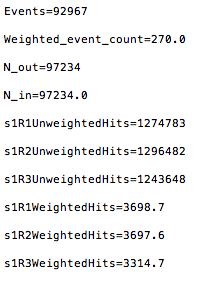Difference between revisions of "Weighted Occupancy"
Jump to navigation
Jump to search
CLAS12 Occupancy
Occupancy(50nA)=
Occupancy(75nA)=
Occupancy(100nA)=
Occupancy(50nA)=
Occupancy(75nA)=
Occupancy(100nA)=
Occupancy=
Occupancy(50nA)=
Occupancy(75nA)=
Occupancy(100nA)=
CLAS12 Occupancy
Occupancy(50nA)=
Occupancy(75nA)=
Occupancy(100nA)=
Occupancy(50nA)=
Occupancy(75nA)=
Occupancy(100nA)=
| Line 56: | Line 56: | ||
| − | <center><math>t_{sim}(75nA)=\frac{N_{in}}{\frac{ | + | <center><math>t_{sim}(75nA)=\frac{N_{in}}{\frac{75E-9\ A}{}\frac{1\ C}{1\ A}\frac{}{1\ s}\frac{1\ e^{-}}{1.602E-19\ C}}=\frac{N_{in}}{468,164,794,007\ e^{-}/s}=250E-9\ s\rightarrow N_{in}=117041.2\ e^{-}</math></center> |
| − | <center><math>t_{sim}(100nA)=\frac{N_{in}}{\frac{ | + | <center><math>t_{sim}(100nA)=\frac{N_{in}}{\frac{100E-9\ A}{}\frac{1\ C}{1\ A}\frac{}{1\ s}\frac{1\ e^{-}}{1.602E-19\ C}}=\frac{N_{in}}{624,219,725,343\ e^{-}/s}=250E-9\ s\rightarrow N_{in}=156054.9\ e^{-}</math></center> |
| − | + | CEBAF has a bunch redition rate of 499MHz for hall B. For a current of 50nA, this implies: | |
| − | <center><math>\frac{ | + | <center><math>\frac{\frac{50E-9\ A}{}\frac{1C}{1A}\frac{}{1s}\frac{1\ e^{-}}{1.602E-19\ C}}{499E6\ Hz}=\frac{\frac{312,109,863,672\ e^{-}}{s}}{499E6\ Hz}=625\ e^{-}<math></center> |
| − | + | If we declare that every 2ns consists of a bunch of 625 electrons each, then | |
| + | <center><math>\frac{78027.5\ e^{-}}{\left(\frac{625\ e^{-}}{2E-9\ s}\right)}=124.844\times 2E-9\ s=2.50E-7\ s</math></center> | ||
| − | <center><math>\frac{156054.9\ e^{-}}{\left(\frac{ | + | |
| + | <center><math>\frac{117041.2\ e^{-}}{\left(\frac{625\ e^{-}}{2E-9\ s}\right)}=187.266\times 2E-9\ s=3.75E-7\ s</math></center> | ||
| + | |||
| + | |||
| + | <center><math>\frac{156054.9\ e^{-}}{\left(\frac{625\ e^{-}}{2E-9\ s}\right)}=249.688\times 2E-9\ s=4.99E-7\ s</math></center> | ||
| Line 76: | Line 81: | ||
| − | <center>Occupancy(50nA)=<math>1.01926\%\frac{ | + | <center>Occupancy(50nA)=<math>1.01926\%\frac{2.50E-7\ s}{250E-9}=1\%</math></center> |
| − | |||
| − | |||
| + | <center>Occupancy(75nA)=<math>1.01926\%\frac{3.75E-7\ s}{250E-9}=1.5\%</math></center> | ||
| − | |||
| + | <center>Occupancy(100nA)=<math>1.01926\%\frac{4.99E-7\ s}{250E-9}=2\%</math></center> | ||
==Method 2== | ==Method 2== | ||
Revision as of 15:53, 27 July 2018
Total XSect=0.013866
97234 incident electrons
Method 1
Using the unweighted amounts
Using the weighted amounts
The non-time terms can be considered to be constant since they are either simple number such as 12 or functions which depend on the same variables such as the number of hits and number of events (Both terms are found by ,thus are only multiples of each other). We can simplify this expression by:
If 250ns is the time limit, then solving the time of simulation backwards will give the number of incident electrons within that window.
CEBAF has a bunch redition rate of 499MHz for hall B. For a current of 50nA, this implies:
If we use these times as the times of simulation:
Method 2
Using the unweighted amounts
Using the weighted amounts
